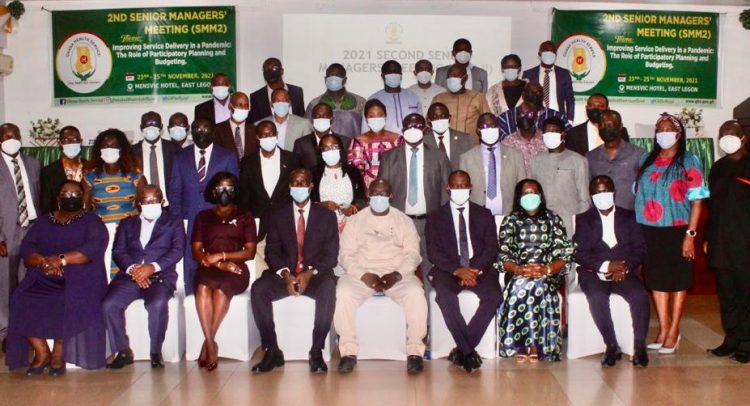Regional Directors and Institutional heads in a group photo
The Ghana Health Service (GHS) has recorded a marginal decrease in institutional neonatal deaths for the first half of 2021.
Provisional data available to the GHS showed a reduction from the 7.5 deaths per 1000 live births, recorded in the first half of 2020, to 7.2 deaths per 1000 live births, recorded within the same period in 2021.
Also, the service recorded a one percent reduction in institutional under-five mortality, posting 9.6 deaths per 1000 live births, as against 9.7 deaths per 1000 live births within the period under review.
The GHS also recorded an increase in childhood immunizations, a 3.51 per cent increase in patronage of antenatal clinics, 14.20 per cent increase in OPD attendance and 14.07 per cent increase in caesarean deliveries.
However, there were no changes to the institutional infant mortality rate which stood at 8.1 and the maternal mortality ratio which remained 105.8 for the period.
These figures were contained in the half year performance review report presented by Dr. Alberta Biritwum-Nyarko, Director of Policy, Planning Monitoring and Evaluation Division (PPMED) of the GHS at the Second Senior Managers Meeting (SMMII) in Accra.
The three day meeting themed, “Improving Service Delivery In A Pandemic: The Role Of Participatory Planning And Budgeting” serves as a platform for an in-depth participatory discussion of policies and priorities for 2022 planning and budgeting.
It will also help to ascertain the fiscal space available for service sustainability and recovery, demonstrate transparency and accountability in the use of Covid-19 resources, and help senior managers discuss pertinent issues that bother on the progress of the Service and the health of the population.
Director General, GHS Dr. Patrick Kuma-Aboagye, said in spite of the ravages of the Covid-19 pandemic, the GHS recorded some significant progress which attests to the country’s resilient healthcare system.
He, nonetheless, observed that as expected, the Covid-19 pandemic affected the implementation of the sector’s plans and budget, as well as its annual Programmes of Work (PoW).
“Responses to the pandemic have occasioned reactive budgeting, re-prioritization, issues of supplementary budgets at all levels,” he explained.
The GHS DG indicated that the situation has not stabilized yet, hence attention needs to be focused on the challenging task of developing credible and equitable plans and budgets that will address the challenges of health service delivery.
He said much remains to be done to offset the impact of the covid-19 pandemic on health service delivery.
“I therefore urge all of us to keep up our relentless efforts and contributions to improving the provision of health care services and ensuring that Quality Universal Health Coverage is not compromised,” he added.
Chief Director of the Ministry of Finance, Patrick Nomo, who was the guest of honour, commended the senior managers for sustaining the activities of the sector even during the pandemic and urged them to collaborate more with stakeholders to facilitate the scale-up of proven cost-effective interventions.
By Jamila Akweley Okertchiri


